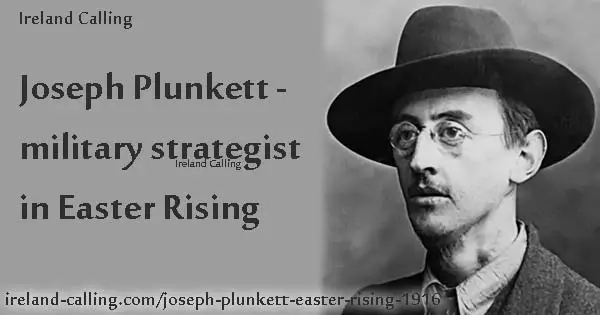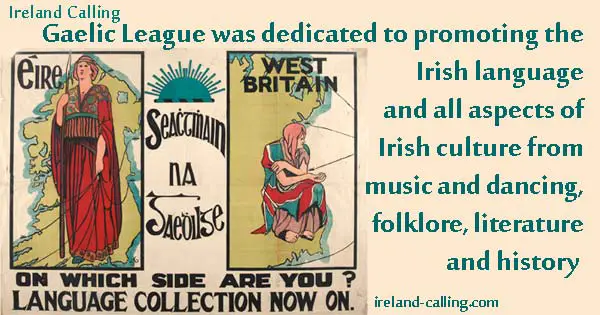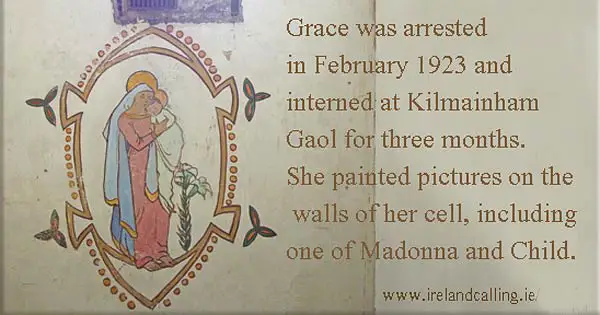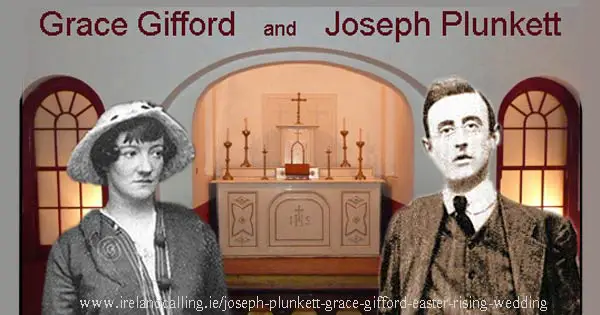Joseph Plunkett was the main military strategist of the 1916 Easter Rising and also provided its most heartrending and poignant love story, marrying his fiancé in jail only hours before being executed.

He was a cultured man who wrote poetry and became a leading light in Dublin literary circles, but he also studied urban military strategy and played a major part in the tactical planning of the Rising. James Connolly described him as the most skilled military planner among the signatories of the Proclamation of the Irish Republic.
Plunkett was born in Dublin on 21 November 1887. He was from a wealthy Catholic family and his father was a papal count. He suffered from tuberculosis as a child and had to spend several periods living abroad in warmer climates during his youth.
His illness afflicted him right up until he took part in the Easter Rising when his condition was so poor that he had to be helped by his comrades, including Michael Collins who was his aide-de-camp.
Military grounding with Officer Training Corps
He was educated at Belvedere College in Dublin where he was taught by Jesuits and later attended Stoneyhurst College in Lancashire in England, where he gained some military grounding with the Officer Training Corps.
He was interested in the Irish language and Irish culture and became a member of the Gaelic League, which brought him into contact with Thomas MacDonagh, who also went on to be one of the leaders of the Rising.
MacDonagh, who was 10 years older and a university lecturer, acted as Plunkett’s tutor at University College Dublin.

The two men had a lot in common, with their interest in the theatre and writing poetry. They struck up a lifelong friendship. They co-edited the arts magazine, the Irish Review and became directors of the Hardwicke Street Irish Theatre.
Despite his wealthy background, Plunkett supported the workers during the 1913 Lockout, an industrial dispute in which workers who wanted to belong to a trade union were prevented by their employers from coming into work.
He was also a keen nationalist and joined the Irish Volunteers in 1913. He was elected on to its provisional committee, and like many of the other Rising leaders, progressed from the Volunteers to the Irish Republican Brotherhood (IRB).
The IRB had been in decline since the Fenian Rising of 1867 but was undergoing something of a revival under one of its veteran members Tom Clarke, together with new energetic young men like Bulmer Hobson and Seán MacDiarmada.
Military Council of the Irish Republican Brotherhood
Plunkett was quickly absorbed into the IRB upper echelon and became a member of its Military Council, which planned the Easter Rising.
He was one of the seven signatories of the Proclamation of the Irish Republic and a member of the Provisional Government. The other six members were Tom Clarke, Éamonn Ceannt, Patrick Pearse, Seán MacDiarmada, James Connolly and Thomas MacDonagh.
Plunkett was appointed Director of Military Strategy and together with James Connolly developed the plan whereby the rebels would occupy strategic buildings and then interlink them as much as possible by breaking through adjoining walls or digging tunnels.
This allowed ease of movement out of sight of the enemy, making it easier to attack from different angles and easier to escape if threatened.
In April 1916, Plunkett was sent to Germany to work with Roger Casement to get supplies of guns to arm the Volunteers in the Rising.
The mission failed when the ship carrying the arms, the Aud, was intercepted off the coast of Kerry. The guns were lost meaning the rebels would be underequipped when the rebellion went ahead.
They still had a small shipment of about 900 Mauser rifles that had been smuggled in through Howth in 1914, but that would not be enough.
Document forged to deceive Volunteers leader Eoin MacNeill
Plunkett was a man of high principles but may have stooped to deceit in helping to forge a document along with Seán MacDiarmada on 19 April 1916, supposedly from the British authorities announcing a clampdown on nationalists and the Volunteers.
The source of the document has not been proven conclusively but its purpose was to persuade the chief of staff of the Volunteers, Eoin MacNeill that they needed to press ahead with the rebellion before it was too late.
The plan backfired when MacNeill discovered that a Rising was being planned behind his back using his Volunteers as troops. MacNeill had always insisted that a rebellion should only take place if there was a reasonable chance of success.
He believed that the loss of the German arms meant success was virtually impossible.
When he discovered that the ‘British document’ threatening clampdown was a forgery, he issued a command on the eve of the Rising telling the Volunteers that they had been deceived and all military activities planned for the next day were cancelled.
The IRB Military Council held a crisis meeting. Without the support of 12,000 armed Volunteers there was little chance of success. They decided to go ahead anyway the following day, Easter Monday, with the 1,200 or so men they could muster in the Dublin area.
Plunkett lived most of his life at the family farm at Larkfield in Kimmage in Dublin. All the family had nationalist sympathies, and Joseph’s brother George also took part in the Rising.
Family home used to house the ‘Kimmage Men’
Their father Count George Plunkett also allowed the farm in Kimmage to play a significant role in the preparation for the Rising. Some of the German guns that were landed in Howth in 1914 were kept there before being distributed to the Irish Volunteers.
The Plunketts also offered a home to several men who returned from England to avoid conscription following the outbreak of the First World War and to plan for rebellion in Ireland.
Michael Collins was among these enthusiastic nationalists who were sometimes referred to as the Kimmage men. They spent their time with Plunkett planning and preparing for the Rising.
They were deadly serious about their mission but they also provided some lighter moments before the fighting began. On the day of the Rising, they set off to march to Liberty Hall where the leaders were to gather.
It was a hot day so they took the chance to jump on a passing tram. Despite being heavily armed and about to kill or be killed in the fight for Irish freedom, they still found it fitting to pay their fares like everyone else with George Plunkett asking the bemused driver for 56 two-penny fares.
Joseph Plunkett often suffered with ill-health and had an operation for tuberculosis shortly before the rebellion.
He remained weak but insisted on leaving his sick bed to play a full part in the Rising. At times he had to be propped up by his staff, including Michael Collins, who helped him towards his position in the GPO alongside Pearse and Connolly.
Marriage to Grace Gifford in Kilmainham Gaol
Plunkett was due to marry his fiancé Grace Gifford over Easter but they had to postpone the wedding because of the Rising.
After the Rising, he was sentenced to death and so he married Grace at Kilmainham Gaol the evening before his execution. The couple were only able to spend a matter of minutes together.
Plunkett was executed by firing squad on 4 May at Kilmainham Gaol. Shortly before he died he reportedly said: “I am very happy I am dying for the glory of God and the honour of Ireland.”
Like many of the Easter Rising leaders, Plunkett was later honoured by having prominent places named after him including, Plunkett Railway Station in Waterford, Joseph Plunkett Tower in Ballymun and Plunkett Barracks on the Curragh in Co Kildare.
His wife of a few hours, Grace Gifford was a talented artist and a keen nationalist in her own right.

She took the anti-treaty side during the Civil War and ironically, was imprisoned herself in Kilmainham Gaol by the new Free State authorities. While there she painted pictures on her cell of the Blessed Virgin and the Jesus as a child.
easter-rising-signatories.html
